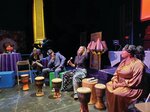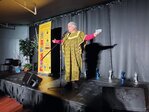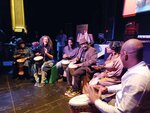For three weeks out of the year, Rhode Islanders are afforded the opportunity to celebrate an art so fundamental to the human experience that one might forget it’s an art at all: storytelling.
…
This item is available in full to subscribers.
We have recently launched a new and improved website. To continue reading, you will need to either log into your subscriber account, or purchase a new subscription.
If you are a current print subscriber, you can set up a free website account by clicking here.
Otherwise, click here to view your options for subscribing.
Please log in to continue |
|




For three weeks out of the year, Rhode Islanders are afforded the opportunity to celebrate an art so fundamental to the human experience that one might forget it’s an art at all: storytelling.
Funda Fest, now in its 26th year, is an annual exhibition of some of the greatest black story tellers in Rhode Island and beyond. The festival’s storytellers draw from cultural roots in Colonial America, the Caribbean, Mali, South Africa, South Providence, and anywhere one can find members of the black diaspora. And it’s all happening now.
Funda means “to learn” in Zulu. It’s a word Valerie Tutson, executive director and co-founder of Funda Fest and the Rhode Island Black Storytellers (RIBS), which organizes the event every year, brought back with her from a trip to South Africa, during which time she was considering how she might emulate the festivals of the National Association of Black Storytellers here in Rhode Island. With the help of Ramona Bass-Kolobe, an original cast member of the Rites and Reasons Theatre at Brown’s Department of Africana Studies, and other local storytellers, as well as a grant from the Rhode Island Foundation, Funda Fest was born.
“Our first year we had invited four artists. And we had one school that we visited and we did two shows,” Tutson said of the festival’s beginnings. “So it was kind of like a little weekend, a long weekend with four artists. This year, we have three weekends all across Rhode Island. And we have more than 26 artists who will be performing.”
RIBS and Funda Fest operated for most of their two decades as a volunteer run non-profit, and while the organization remained solvent for all that time, the turbulence in the country which resulted from both the pandemic and the protests following the killing by police of George Floyd, Tutson and RIBS chose to consider the organization’s longevity.
“I think we got to experience sort of a racial reckoning, and we’re, oh my gosh, what’s happening with black nonprofits in the state?” Tutson asked. “You know, there was this awareness that you know, less than 3% of our nonprofits in Rhode Island are run by people of color.”
In the following years up unto the present, RIBS has taken on a full-time executive director, Tutson, as well as a business manager. In addition to the festival, they now host storytelling camps for kids during February, April, and summer vacations in concert with the Rhode Island Department of Education. They will also be launching a “legacy program” aimed to teach adults storytelling skills.
Tutson herself is an accomplished storyteller with a deep well of cultural memory. She has performed around the country and internationally, drawing on tales of the black experience in American history, and stories from south and west Africa. She sees the role of storytelling in every culture, and particularly in black culture, as essential to learning one’s values and “how to be in the world.”
“Sometimes those historical stories or even the folktales give you real insight into the cultural values that have survived,” Tutson says. “And if we kind of had access to those, I tend to think we wouldn’t be so crazy right now. You know? We would understand our place in humanity, not just our moment in time.”
The inaugural event of Funda Fest 26 was a party held in the Rites and Reasons Theatre, a black box in which many of RIBS’ most prominent members trained, performed, and learned the craft of storytelling. The shadow of one man in particular looms large over the party goers. A man whose name adorns the entrance to the theatre. A man who, during a lull in the music, the storytellers would take time to tell stories about: George Houston Bass.
Ramona Bass-Kolobe was a student at Brown when African American students staged a walkout, demanding a deeper commitment from the university to students of color. She was also a student two years later when Houston Bass, a prolific playwright and director, was hired to teach theatre and Afro-American (now called Africana) Studies. She would also later go on to marry the man.
“This is my womb,” Bass-Kolobe said as she sat in the black box, holding her cane between her legs as her daughter, contemporaries, and former students listened on. “Before I came into this room, and this became my womb, I was part of a group of black students at Brown who were doing black theater and we said ‘Oh, this is black theatre! But we want somebody to come show us the way.’ And so George Houston Bass graciously agreed to come up and guide us on the journey of not just reading plays out of a book, because he told us the plays you need to do are the plays that come out of your people and your mind and your community. And so we said ‘Well, what does that look like?’ And he said ‘Go start doing the research!’”
Houston Bass encouraged his students to go out into the communities of Providence and collect stories, from which they would create performances. From this formula, Rites and Reasons Theatre was born, and the traditions established there would go on to influence the performances seen at Funda Fest today.
Performances like those of Len Cabral, another founder of RIBS, director of Providence Inner City Arts, and 46 years a storyteller. Cabral often works with educators to help them develop storytelling skills as a daily learning aid in the classroom. He was gracious enough to explain his methods during the party.
“I do the approach of three E’s — entertainment, education, and engagement,” he says. He explains that of the three, the last is most crucial of all. “Without engagement, there’s no entertainment happening. There’s no education … The most important thing is engage your listeners. Then you can take them places.”
“Say I’m telling a story to a group of third-graders,” Cabral continues. “I’ll ask them a question they know the answer to. I’ll say ‘Do rabbits have short or long tails?’ I know they’re gonna say ‘Short!’ And I’ll say ‘Well NOW they do!’ Then I’ll go like this …”
Cabral leans in close, and drops his voice low and, conspiratorially, he begins, “Long ago … Just that movement tells the audience ‘You’re gonna tell us a secret!’”
Cabral will be hosting Funda Fest’s Liar’s Contest this year on Feb. 2 at the Cape Verdean Club in East Providence. The contest is an opportunity for non-professional storytellers to try their hand at spinning a yarn. Participants will have five minutes to tell a family friendly lie, to be judged on Originality, Delivery, and Audience Response, for a first place prize of $200.
Rachel Briggs, an elementary school science teacher in Providence, uses those same skills to enrich and enliven her classes.
“[Storytelling] can be so useful in the classroom for every subject,” she says. “Every subject, you can break off into a story. Or you get take the information that we’re giving to students and fix it in a way that it creates a story, and it’s so more it more meaningful! When we relate it to something at their age level, it just makes sense, because kids know stories. Whether they’re reading or not they’ll know stories, they can’t help it.”
Briggs often uses her skills as a storyteller and a science teacher to highlight black scientists who haven’t received the celebration they deserve. She gives an example: Granville T. Woods. Woods was an African American inventor who lived during the latter half of the 19th century, who held over 50 patents.
“So I focus on those comprehension questions,” she says of her process. “What, when, where, how, and why do we care about him?”
“I don’t get hung up on dates, because I feel like those are fillers that kids will pick up on later on,” she continues. “What’s more important is who he was. Where he started, in terms of the place and the time and how he got to be the adult he was. His persistence. He was in a time where no black man would be recognized for what he was doing. But he still did it.”
Like Cabral, Briggs says engagement is most important of all, and there’s cognitive science backing the claim. “I was reading this book about culturally responsive teaching, and it turns out the brain, once it gets information, it takes 20 seconds before the brain decides whether or not it will continue engaging in what you’re talking about. So storytelling from the start, you have to be engaging, so that the audience wants to go further with you in the story.”
Briggs performed in the first act of Funda Fest 26’s first evening performance “Storytelling for Grown Folk” at the Southside Cultural Center Of Rhode Island in Providence on Saturday, Jan. 20. She, along with Tutson, Bass-Kolobe, and a few others from RIBS’ “Mothers” each took a turn telling stories from history, or their own lives.
Briggs told an uplifting story about her own choice to rise above the opinions and perceptions of others. Bass-Kolobe told of a trip she took with her husband to Botswana, and her sometimes harrowing, sometimes humorous encounters with packs of urban baboons. Tutson took on a story of a woman escaping slavery and her journey from Alabama all the way into Canada with her dog in tow.
Award-winning playwright, poet, and performer David Gonzalez was the evening’s headliner. He chose to perform the Greek myth of Orpheus and Eurydice through the lens of 20th century black musicians who had influenced him throughout his life: Lightnin’ Hopkins, Muddy Waters, Sonny Terry and Brownie Mcghee, a long list of those whom he calls “The Real S---.”
Before he began, he apologized for an illness in his throat and what effect it may have on his performance. Then he launched into a perfect, lightning quick stretch of scat and air-saxophone. His retelling of Orpheus, the greatest musician in the world and Eurydice, his wife who was bitten by a snake and snatched away to the underworld on their wedding night, was sharp, elegant, hilarious and tear-wrenching, punctuated with acapella snippets of those musicians he loved so much. He rarely seemed to take a breath and neither did the audience. Engagement, Briggs and Cabral would point out.
“Sometimes I call storytelling ‘poor theater,’” Gonzalez said after the show. “In that we are the orchestra. We are the stage. We are the light. We are the sound. We are the lyricist. We’re the book-writer where, you know, it’s all in there. And my style personally is, you know, I’m coming at music and movement. So I really tried to bring those elements into my voice, into my gestural vocabulary, into creating a world that is sort of theatrically enchanting.”
Speaking more on the thesis of his performance, Gonzales said, “For me, black music has been a guiding light in terms of personal expression, creative courage, discipline, generosity, soulful fun, community and a secular kind of spirituality. You hear somebody like Stevie Wonder, and you hear it, you hear it, hear it in great black music. It’s the integration of spirit and soul, heart, hard work, and it moves through that space.”
Such masters will be putting their craft on display throughout the rest of the festival. Production Manager Marlon Carey is particularly excited to have invited Dr. Amina Blackwood Meeks to perform, in collaboration with the Jamaican Association of Rhode Island.
Meeks is an award-winning writer, actress, storyteller and advocate from Jamaica who was compared by different people at the party to such stars among folklorists as Miss Lou and Zora Neale Hurston. Carey notes she is also an instrumental part of the push to make Jamaican Patois the official language of Jamaica. Meeks will be at multiple events throughout Funda Fest, the first of which will be at an event titled Afro/Caribbean Storytelling in South County South Kingston High School on Jan. 25.
Carey, an immigrant from Jamaica himself living in the United States since childhood, has become an expert on the unique phenomenon of black storytelling in Rhode Island through work with numerous organizations in Providence. He spoke of a project he was hired to do with the Womens’ Project at Brown, for which he had an opportunity to research Rhode Island’s deep embroilment in the Atlantic slave trade.
“Rhode Island was one vertex on the triangle trade,” Carey said. “So this has a rich history of the diaspora.”
He continued, “If more than half of the voyages that left from America to go enslave individuals left from Rhode Island, that must mean that everybody who was on a ship needed sails. Sails are made here; you’re going to need provisions. Butter, wool, you talked about coffee, you talk about the manacles.”
He brought up the Sally, a slave ship owned by the Brown family in the 18th century on which over 100 enslaved people were murdered by the captain, died of disease, starvation or suicide on just one deadly voyage. Carey pointed out that it was not only the Browns who had a stake in that voyage. Average Rhode Islanders also took out bonds on the Sally’s voyages.
Enslaved people always lived in Rhode Island, Carey said. Financiers exploited their labor to do book work. They were seen on Providence streets shopping for their captors or working at skilled labor in cooper shops building barrels. Their labor was used to build Brown.
“All of this Ivy League prestige is built, literally built by people volunteering their enslaved individuals for a piece of the pie,” Carey said.
“And if you’ve never been on the receiving end of the reverberation of that kind of pressure and all that you can’t tell somebody to get over it,” Carey said. “You can’t say ‘aren’t we actually done with that yet? We’re so far past that.’”
All that said, Carey looks to times in America’s history when people of all races have stood together, and that too needs to be recognized.
“We still need to grow and we can get together on this,” he said. “Because if I look at the Dr. Martin Luther King pictures, there are lots of black and white arm in arm in arm. He’s holding hands with a white priest. You know, he’s holding hands with the Jews are there supporting him.”
“This is part of what RIBS does is to tell the stories, to share them, and have us figure out how we can understand that it is our collective story,” Carey said. “That it’s American history. Not black history. There is no American history without black history, we need to hold that together and move forward on that level and not continue any separations.”
In 2023 RIBS and Funda Fest were selected by the Rhode Island Foundation to receive a $100,000 seeded endowment fund. The fund, which will continue to grow over the years as the organization develops, will help to ensure RIBS’ ability to continue telling a more complete history of Rhode Island, the United States, and the world well into the future.
Tutson expressed her gratefulness for the investment in RIBS’ future in true form, with a story. “There is a storyteller who teaches us a song from Malawi and the greeting is ‘I see you, I see with my eyes and my heart in front of me and I greet you with respect.’ It feels as if we’ve been seen.”
Funda Fest will be holding performances as well as film screenings until Feb. 3. For details, tickets and RSVP info, visit fundafest.org.
Comments
No comments on this item Please log in to comment by clicking here